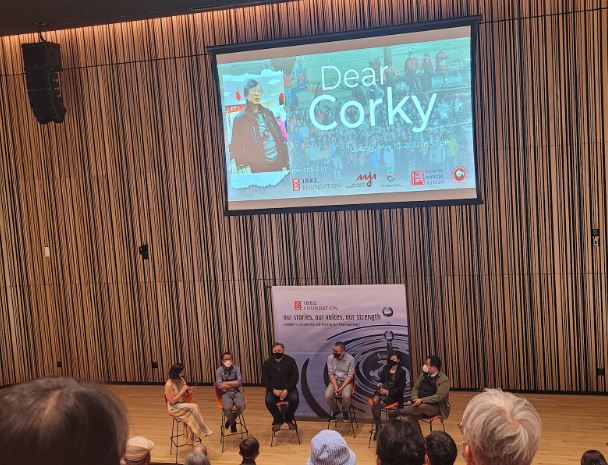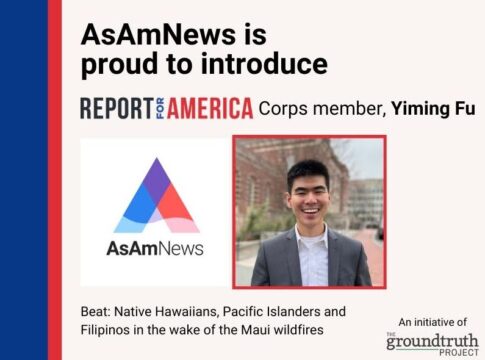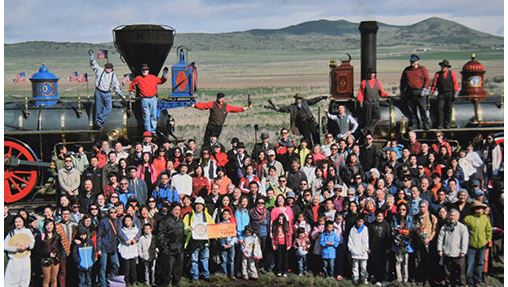By Jessica Xiao, AsAmNews Contributor
WASHINGTON, DC – Dear Corky, a documentary featuring late photographer Corky Lee, known for his life’s work depicting Asian America, screened at the newly renovated Martin Luther King Jr. Library in Washington, DC.
The 1882 Foundation in partnership with the Asian American Journalists Association’s DC chapter, hosted the screening on May 10 because of the date’s significance.
On May 10, 1869, Union Pacific and Central Pacific Railroads celebrated the near completion of the Transcontinental Railroad, capturing the famous “champagne” photo of railroad workers that omitted all the Chinese laborers.
In 2014, the 145th anniversary of the celebration, Corky Lee replicated the photograph featuring instead descendants of Chinese laborers in an act of “photographic justice” to correct the omission.
LATEST STORIES
The Chinese Railroad Worker Descendants Association and OCA Asian American Advocates Utah held a concurrent screening in Utah.
Curtis Chin and Kenneth Eng, follow Lee in locales mostly within his home and main subject, New York Chinatown, in the years before he died from COVID-19 in January 2021. Eng, the editor and director of photography, shares some of Lee’s most important works and his motivations for a lifetime of documenting the daily life and activism of Asian immigrants and Asian Americans.
Corky’s brother John Lee submitted a video message calling the film “an intimate peek into the passions of a very private person, both bittersweet and poignant.”
“Corky’s gravitation to and mastery of his chosen medium was in service to his unique interpretation of JFK’s inaugural challenge, ‘Ask not what your country can do for you, but what you can do for your country,” John Lee said. “Corky chose to raise the consciousness of Asian Americans, their communities, and the nation as a whole, so that we knew, everyone would know, that we were here, we are here, and that we are an integral element and asset to the building of a more perfect union.”

The film project began in 2018 when Chin and Eng wanted to make a collection of shorts highlighting different Chinatowns and activists. They went to Chinatown in New York City to capture footage and interviews numerous times for Dear Corky as well as for other projects. After Corky’s untimely death, they decided it was imperative to focus on finishing the piece on Corky Lee first, despite having little to no funding for the project.
“Our goal was to make an auditory and visual experience that celebrates Corky’s life while really capturing who he was as an artist and beloved member of the community,” Eng told AsAmNews. “Our hopes are that the film gets seen by as wide an audience as possible and people get an idea of who he was and what he meant to our community. He really ‘saw’ the community in a way that many others did not—and was always on the forefront of being active! I think that’s what inspired me the most: his tireless effort to combat racism, discrimination, and injustice with his activism and photography.”
Since Corky’s death, there has been renewed interest in celebrating and preserving his work and legacy. The estate of Corky Lee announced on the first anniversary of his passing an upcoming photo book to be published by Penguin Random House in 2024.

Both Chin and Eng have been personally impacted by Corky. In a panel after the screening, Chin shared that Lee was one of the first people he had met when he moved to New York City in 1990. “It was inspiring to see someone so committed to attending everything in the community. I stayed in touch with him over these past thirty years. I even included him in the first film that I produced, Vincent Who?,” he said to AsAmNews.
Although Corky Lee hosted a screening of Kenneth Eng’s first documentary film Kokoyakyu: High School Baseball in 2009, they didn’t reconnect until a decade later: “We then lost contact until I finished my next film My Life in China and was traveling around and screening it. At that point, we connected and became friends.” Eng credits Lee as being an influence in his work and role as a community filmmaker.
The documentary was followed by a panel discussion (that was streamed online) of photojournalists Kent Nishimura, Shuran Huang, Francis Chung, JM Giordano, and director of film, Chin, moderated by Washington Post education reporter Moriah Balingit.

Discussions revolved around the biases that typically show up in imagery that perpetuate stereotypes of Asian American communities, the ever-contentious intersection of journalism and activism, the importance of capturing historic Asian American activism in the labor movement, against police brutality, and other causes, and how journalism today can use Lee’s legacy to do a better job covering underrepresented communities, namely, by addressing the lack of Asian Americans photojournalists.
“It’s hard for me to find an Asian photo editor in DC,” said Shuran Huang.
Panelists also shared the importance of language (Lee often spoke Toisanese, the native language of many immigrants who live in Chinatown) in accessing and documenting communities, as well as the diversity of Asian America.
“Filipinos just get forgotten even though we are the second or third largest group of Asian Americans in the United States,” shared Moriah Balingit, who recalled buying a print of Lee’s photograph of lolas (Filipino word for grandmother) dancing in Queens, New York, early in her career because it was the first time she saw a photo of Filipino Americans that really represented Filipino America.
The filmmakers hope to make the film more widely available, especially to students and educators and intend to screen it at future film festivals and in collaboration with community groups across the country.
“With this short doc, we hope to bring attention to Corky’s legacy–his life and work as a beacon of continued struggle for justice and equality not only for Asian Americans but for all marginalized communities,” said Eng.
More information about Dear Corky can be obtained by contacting the filmmakers directly at [email protected].
The panel discussion can be found online.
AsAmNews has Asian America in its heart. We’re an all-volunteer effort of dedicated staff and interns. Check out our new Instagram account. Go to our Twitter feed and Facebook page for more content. Please consider interning, joining our staff, or submitting a story, or making a contribution.









